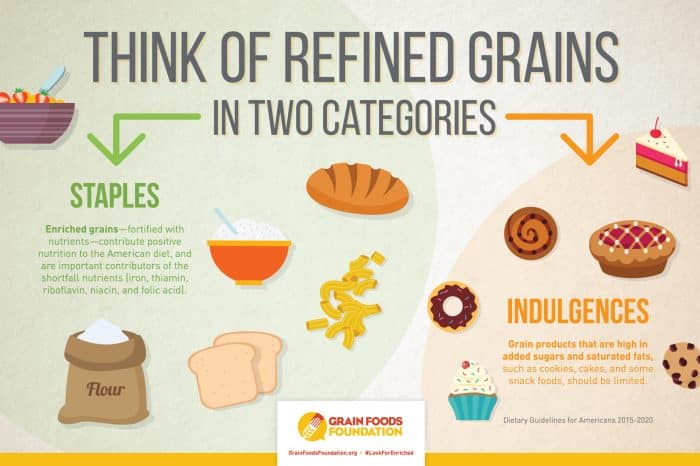Nutrition advice can be overwhelming, with new headlines regularly touting the Dangers! of one food, and the Life! Saving! benefits of another. The benefits may sound appealing, but when we cut out entire food groups we put our health at risk by lowering the likelihood of achieving adequate nutrient intakes. Fortunately, over here in the real world, we know to tune out that noise and instead focus on evidence-based nutrition advice (for example, the importance of dietary patterns rather than individual nutrients) that encourages a rather delicious menu of foods to kick-off your morning!
Not all grain foods are the same, but luckily, all grain foods truly provide important plant-based nutrients necessary for health, including dietary fiber, B vitamins (folate, thiamin, niacin), iron, zinc, magnesium and calcium.

Enriching grains is essentially the act of adding some nutrients back to the grains after they’ve been refined. As an added bonus, iron and other nutrients are also thrown into the mix (fortification), resulting in grains being a significant contributor of folic acid to the American diet.
Fun Fact: This small tweak reduced our nation’s prevalence of neural tube defects by 35% over a 13-year span!

Whole grains aren’t refined, so the naturally occurring nutrients are undisturbed. As a result, their nutrient profile is more diverse in that they also provide antioxidants and phytonutrients in addition to the vitamins and trace minerals that are naturally present at harvest.

We have yet to meet a picky eater who refused grain foods. What toddler doesn’t love a bagel, a waffle, or piece of toast? Many a parent (and, ahem, spouse) has learned that those lovely grain foods, be they enriched or whole, are the perfect delivery method for those ingredients that might challenge a less sophisticated palette.
Think of grains in two categories: indulgent and staples.
While both categories bring delicious flavor to any meal or snack, the winningest moments happen when you pair them with other macronutrients found in nutrient-dense foods.

Now that we understand how important it is to start our day with a balance of macronutrients, it’s time to put that knowledge to work! Here are some simple ideas for building a delicious and decidedly nutritious first meal or snack of the day.
Pro Tip to Sneak in the Good Stuff: Make a powerfully nutritious breakfast for those picky eaters by sneaking finely chopped or pureed vitamin C-rich cauliflower into your next batch of scrambled eggs with cheese! Serve with a side of whole grain toast, and voila: Macronutrients FTW!
It’s surprisingly easy to ensure your first meal or snack of the day includes all three macronutrients – carbohydrates, protein and fat!





